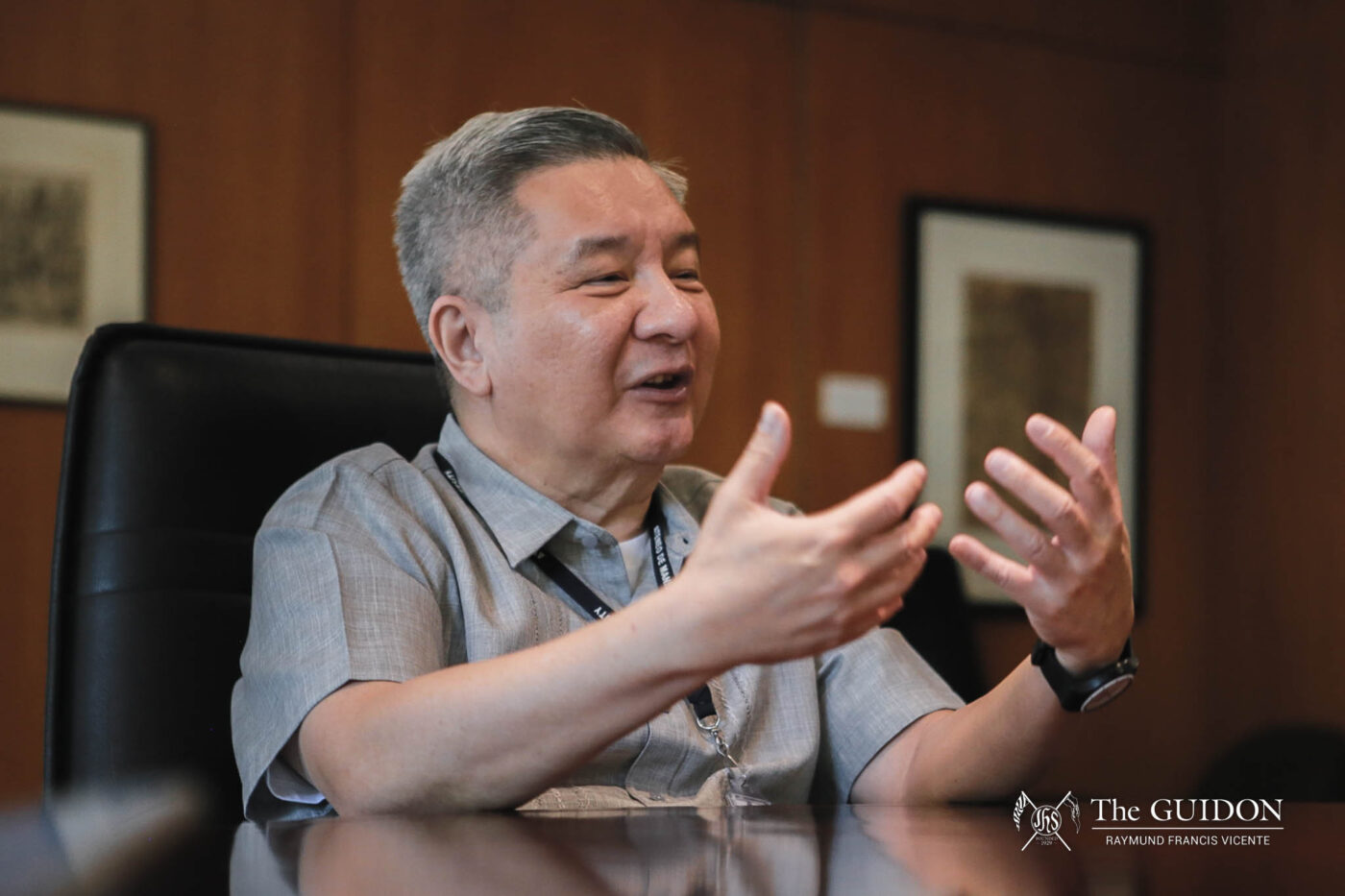THE ATENEO de Manila University commits to becoming a Laudato Si’ university by 2029 as a response to Pope Francis’ environmental encyclical by the same name, which calls for a concrete step toward “caring for our common home.”
Through the Laudato Si’ commitment, University President Roberto C. Yap, SJ believes that Ateneo will be able to further become a socially and environmentally responsible institution. He also highlights the role of spirituality in fostering a “culture of care for nature, each other, and the poor.”
Currently, the University is already in its planning phase. The implementation of this plan would start on the Laudato Si’ journey’s second year.
In an interview with The GUIDON, Yap also stated that other Philippine Catholic universities are also participating in this mission, such as the De La Salle University and the University of Santo Tomas.
Behind the plan
Through this seven-year journey, the University particularly aims to support integral ecology as a priority area of its Lux-in-Domino Strategic Plan. Yap shared three key goals for this aspiration, namely: the integration of the Laudato Si’ Action Platform (LSAP) into Ateneo’s strategic plan; the pursuit of carbon neutrality by 2030; and the continued effort to achieve the United Nations’ Sustainable Development Goals.
The Laudato Si’ journey officially began last November 14, 2022. This was followed by a session of The President’s Hour last November 18, which was dedicated to expounding the University’s current journey progress and its Laudato Si’ Plan (LSP) which is meant to be “feasible but also transformative.”
Working toward the fulfillment of this “magis” aspiration, the Laudato Si’ Coordinating Council (LSU-CC) and Working Group (LSU-WG) were formed, both of which are working under the leadership of the Ateneo Laudato Si’ Coordinator Charlotte Kendra Gotangco Gonzales.
In correspondence with The GUIDON, Gonzales noted that the LSU-WG was responsible for the fulfillment of the requirements for the Laudato Si’ journey, namely the reflection video and the initial contents of the proposed LSP. These outline how the University intends to pursue the seven Laudato Si’ goals.
On the other hand, the LSU-CC consists of representatives from units who will implement and coordinate the final Laudato Si’ Plan. Currently, the identified necessary offices are those involving the Vice President for Mission Integration, the Vice President for Basic Education, the Vice President for Administration, and the Vice President for Finance and Treasurer.
According to Gonzales, the current structure for the Laudato Si’ Magis aspiration will still be changed to allow the involvement and contribution of more stakeholders in this seven-year journey. In particular, they plan to have a two-part structure consisting of a coordinating council and a volunteer-based multi-sectoral champions circle.
Currently, the LSU-WG is refining the details of the LSP, as well as consulting with the different units relevant to the Laudato Si’ journey.
Laudato Si’ plans
Adhering to the discussions held during the meeting of the International Association of Jesuit Universities last 2010, the University adopted the LSAP, which aims to assess universities’ environmental programs and projects.
These assessments are based on seven main areas: responding to the cry of the poor; responding to the cry of the Earth; fostering ecological economies; adopting sustainable lifestyles; providing ecological education; offering knowledge and guidance in ecological spirituality; and aiding local community resilience and empowerment.
In achieving these goals, Yap shared with The GUIDON that the University has established the Ateneo Institute of Sustainability as having the prime directive of creating programs and plans to push the school’s environment-development agendas.
Elaborating further, Yap said that these programs will be related to teaching, formation, research, and service. He extends an invitation for students to join the Laudato Si’ journey and its programs on developing ecological spirituality.
Regarding the University’s plans for achieving carbon neutrality within the campus, Gonzales stated in the President’s Hour how their office will be accounting for different sources of greenhouse gas emissions within the school.
Using the data they will be collecting, she stated that they will make policies and projects that aim to address the sources that they find. In making these plans, she added that there will be separate and more targeted consultation sessions during these stages.
Given that the Laudato Si’ plan targets to achieve Sustainable Development Goals 1 to 17, the University commits itself to laying out projects which address poverty, hunger, health issues, education, and gender equality. These also seek to address water and sanitation, renewable energies, economic growth, innovations, inequalities, sustainability, responsible consumptions, climate action, aquatic life, terrestrial living conditions, peace, and partnerships.
Gonzales said that this plan reflects the University’s gaps in the Times Higher Education Impact Rankings as well as the Action Plan for the Renewed Province Plan made by the Philippine Province Jesuits for 2021 to 2024.

Action through Magis
As the Laudato Si’ journey begins, the student body, as well as student organizations are called to help in the administration’s efforts to achieve its Laudato Si’ Goals.
Yap stated that he hopes to hear from student organizations and what projects they can propose as well for this endeavor, may it be through service projects or outreach. He also said that he hopes the student body would participate in recollections and retreats on ecological spirituality, as well as projects with communities on environmental issues.
When asked whether the Ateneo would be the first Laudato Si’ University in the country or in the Asia-Pacific region, Yap said that the University sees the title not as a prestige similar to university rankings. Instead, it is a call to action.
“We are really hoping that we [would] have a lot of Laudato Si’ Universities because that means that the Laudato Si’ movement is really widespread,” Yap expressed. “In fact, in the Ateneo Network, all five universities have said that we will pursue the Laudato Si’ journey.”







